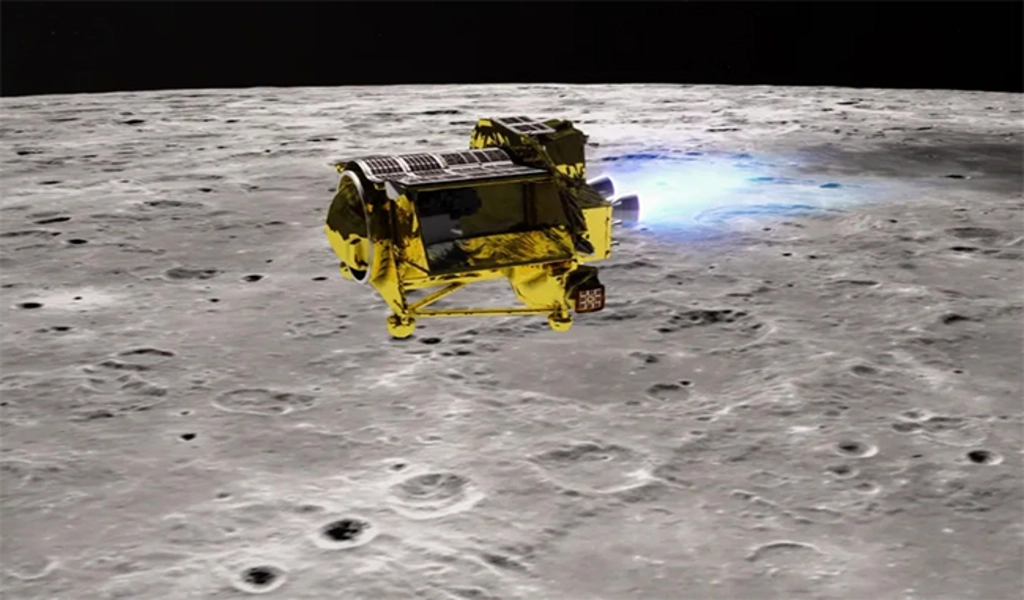News
Japan Makes History as Spacecraft Lands on the Moon

(CTN News) – Japan placed its first probe on the moon following a series of setbacks to the country’s space programme, but a power outage could cut the mission short.
The SLIM lander, dubbed the “moon sniper,” landed 20 minutes after midnight Japan time on Saturday morning. The H2-A heavy payload rocket launched the lightweight lander in September, which Mitsubishi Heavy Industries Ltd. and the Japan Aerospace Exploration Agency jointly developed.
According to JAXA, the lander reached the surface and deployed a rover to collect data. While the rover is sending a signal, the agency reported that the lander’s solar cells are not producing electricity, which means it may run out of power within the next few hours. A heater has been turned off to preserve the battery’s power, and the lander may recharge as the sun moves.
“We believe we have met the minimum criteria for success,” a JAXA official told reporters.
The Smart Lander for Investigating Moon’s soft landing — in which a spacecraft is brought to a controlled stop — places Japan in exclusive company, with only the United States, USSR, China, and India having previously accomplished the feat.
Exclusion from the elite club has been a source of frustration for Japan, which launched its first satellite ahead of archrival China in 1970 but has subsequently fallen behind a slew of high-profile Chinese space triumphs. This involves the first-ever soft landing on the moon’s far side in 2019 and a landing on Mars in 2021.
India has also outperformed Japan, landing near the lunar south pole on its second try in August. While the United States and the Soviet Union deployed spacecraft to the moon during the Cold War, both countries have struggled to return: Russia’s Luna-25 crashed in August, and a NASA-backed mission from Pittsburgh startup Astrobotic Technology Inc. failed this month.
For Japan, landing on the moon has proven even more difficult. JAXA lost touch with a lunar lander in late 2022, while Tokyo-based Ispace Inc. experienced a communication breakdown with a ship heading for the moon in April.
Other losses include the unsuccessful launch of JAXA’s H3 heavy-lift rocket, which failed after takeoff in March and has not flown since. Meanwhile, JAXA’s smaller Epsilon rocket was also halted after an explosion in October 2022.
The ability of SLIM to select more specific landing spots can improve future efforts to explore resources such as water, potentially increasing demand for lunar missions, said Takeshi Hakamada, Ispace’s founder and CEO, in an interview Friday.
Big Japanese corporations have joined the effort to boost the country’s space capabilities. Toyota Motor Corp. is JAXA’s partner in developing a lunar rover, while Honda Motor Co. is collaborating with the agency to construct a system for producing oxygen, hydrogen, and energy on the moon. Ispace’s corporate partners include Japan Airlines Co., Mitsui Sumitomo Insurance Co., and Citizen Watch Co.
The lunar landing will also boost JAXA’s profile as the government finalises a proposal to provide the agency 1 trillion yen, or $6.8 billion, over ten years to promote space enterprises and researchers.
“There is a strong consensus in Japan that there will be a significant moon economy in the coming decades,” said Luigi Scatteia, leader of PwC Advisory’s worldwide space practice. “The country wants to be one of the pioneers in exploiting that.”
Closer to home, Japan requires JAXA to play a larger role in space security, and the agency has expanded the country’s spy satellite network.
The government intends to expand the country’s orbital fleet to stay up with neighbours such as China, which has the second most surveillance satellites in orbit after the United States.
“There is definitely a race for space technologies” in the region, said Saadia Pekkanen, director of the University of Washington’s Space Law, Data, and Policy programme. “For Japan, these realities mean even greater reinforcement of its space-based surveillance and communication capabilities for military purposes.”


























